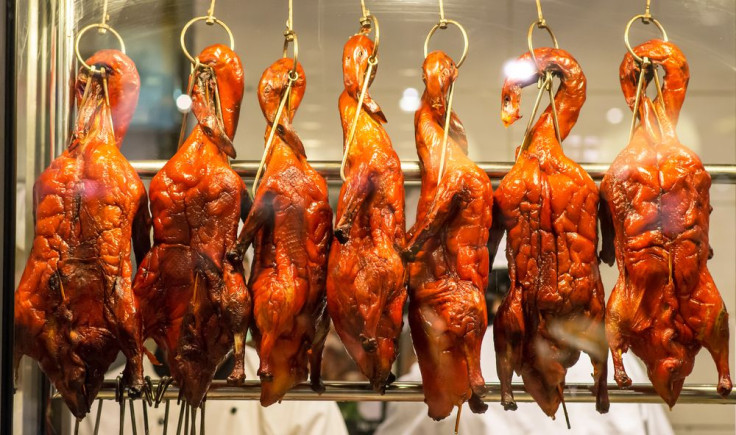Restaurant-Goers Prefer Food Authenticity Over Hygeine: Consumers Want Chinatown Duck, Even If It's Teeming With Bacteria

Walk through any city’s Chinatown and you’re more than likely to see restaurant upon restaurant with ducks, chickens, and sometimes, pig parts, hanging in their storefront windows. Just like the streets of New York’s Chinatown, some people may view these practices as dirty, but many of us still go to these places — they’re as authentic as you’re going to get, unless you go to the homeland. A new study from Stanford Graduate School of Business now finds that this authentic experience is exactly the reason why we frequent these areas, even if it puts our own health on the line.
“Authenticity seems to buffer businesses against negatives,” said Glenn Carroll, a professor at the graduate school, in a press release. “It makes their products more appealing and at the same time, can buy them some insurance.” That was the conclusion Carroll came to after analyzing the balance between two social-based codes used to judge restaurants. One of them, called imperative code, is based on how well the restaurant complies with local health codes. The other, called interpretive code, is based on the restaurant’s image; is its atmosphere true to the food it is serving?
The idea for the study came from an experience Carroll and a colleague had during the 1980s in Los Angeles, when the health department cracked down on Chinese restaurants for hanging ducks in their windows for hours at a time. Despite seemingly good intentions — the ducks were at room temperature, apparently — the health department’s regulations were met with widespread objections; people wanted authenticity, regardless of health implications.
For his current study, Carroll looked at customer reviews for over 9,700 restaurants in L.A., which were posted onto online review sites. While analyzing reviews, his team also looked for keywords indicating authenticity and a lack thereof. In conjunction with that, he also looked at the restaurants’ health department grade, which was given to them after inspection, and was displayed for anyone to see on their store windows. By comparing all of this, the researchers were able to compile data on how much authenticity might trump health code violations.
Staying true to 80s Angelinos’ sentiments, the researchers found that interpretive code was considered more important to consumers than imperative code. Sure, today’s consumers were disgusted by low health grades, but overall, they were more willing to look the other way if the place seemed more authentic. By comparison, restaurants with low health grades that were also deemed inauthentic were considered to be of lesser value.
Around the same time (1993), the Philadelphia Health Department was also combating hanging ducks in Chinatown restaurants. While the health department argued that these hanging ducks, which were already mostly prepared, promoted the growth of bacteria, restaurant owners argued that the ingredients used to prepare them prevented growth. Salt, MSG, sugar, spices, and vinegars all act as preservatives, they said, according to The Philadelphia Inquirer. However, the health department said there was no proof. “We’re not out to get Peking duck, but until proven otherwise, until we have scientific evidence, we have to go with what our health code states,” former Assistant City Solicitor Amy Norr, who handled food cases for the Health Department, told The Inquirer. “Just because you’ve been doing something for hundreds of thousands of years doesn’t mean it’s safe.”
Whether it’s safe or not, it seems the public knows exactly what it wants: that Peking duck.
Source: Lehman D, Kovacs B, Carroll G. Conflicting Social Codes and Organizations: Hygiene and Authenticity in Consumer Evaluations of Restaurants. Management Science. 2014.



























